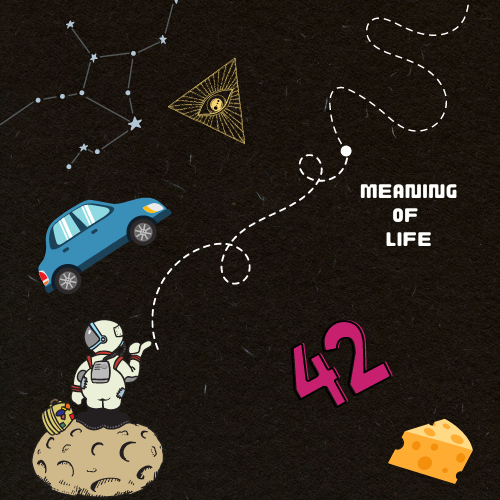Finding your life’s calling (part 2)
If you missed Part 1 of this post, it’s worth checking out for a more theoretical perspective on discovering your life’s calling. This post blends theory and practical insights, drawing inspiration primarily from the wisdom of Robert Greene (as before) and Viktor Frankl. Frankl offers a useful perspective as a psychiatrist, neurologist, and Holocaust survivor who spent his life developing an ideology on how humans are primarily motivated by finding and fulfilling meaning.
The process of uncovering your life’s meaning begins with asking the right questions and then turning inwards.
“What is the meaning of life?” is the wrong question
The biggest mistake people make when searching for meaning is asking overly broad questions like, “What is the meaning of life?” and expecting valuable, specific answers. Even The Hitchhiker’s Guide to the Galaxy dismisses the question—humorously concluding after a 7.5-million-year computational analysis that “what is the meaning of life” is a bad question, and the answer is the number 42 :).
Similarly, Frankl uses a chess analogy to show the question’s futility, noting that any useful response would be heavily nuanced and situational, differing from person to person:
“To put the question in general terms would be to the question posed to the chess champion: ‘Tell me, Master, what is the best move in the world?’ There simply is no such thing as the best or even a good move apart from a particular situation in a game and the particular personality of one’s opponent.”
“What is life asking of me?” is a better question
Rather than asking a single overarching question, we should ask a smaller, more specific question. Drawing from Frankl’s ideas, we should ask ourselves, “What is life asking of me?”
Building on the idea of unique inclinations discussed in Part 1, everyone has DNA-driven inclinations guiding them towards a particular vocation. It’s these inclinations that set individuals apart and enable them to contribute exceptional things to the world. The key to meaning lies in using these inclinations to do what no one else can—to do what life is asking of you.
“What is life asking of me in this moment?” is an even better question
Thinking about “what is life asking of me in this moment” encourages us to see life as a series of questions with answers that continually change—especially at important junctures, like career changes, big moves, and changes with friendships or relationships.
Imagine aligning every significant decision or reaction to obstacles you face with your broader purpose. This continual reflection could reshape how you spend your time, make decisions, and choose the people you surround yourself with, and enable you to see challenges as opportunities to create meaning through your choices.
Analyze patterns in your inclinations
Now that we’re asking the right questions, the next challenge is answering them. Greene asserts that the first step in realizing your life’s purpose is to look inward and reconnect with your inclinations:
“The process of realizing your Life’s Task comes in three stages: First, you must connect or reconnect with your inclinations, that sense of uniqueness. The first step then is always inward. You search the past for signs of that inner voice or force.”
There are a few ways you can do this.
Look to the past
Start by reflecting on the toys, games, and activities you enjoyed as a child. The goal is to find underlying patterns in your interests—identifying the activities that evoked a sense of deep wonder, pleasure, or heightened awareness. This is important because these patterns reveal what you were naturally drawn to when external incentives (like money, stability, prestige, or approval) were absent.
Avoid broad answers, like “I enjoyed playing with Legos.” Instead, really think about the reasons behind the enjoyment. Did you like the problem-solving element or creating stories with the Legos? Or maybe you liked creating something visually appealing.
Then, make a list of all of the activities you genuinely enjoyed (start with a minimum of five), and isolate the specific reasons you enjoyed them. Analyze the commonalities across activities.
Question the present
You can also assess your reactions to current activities to gauge your inclinations. One way to do this is to identify the tasks where you lose track of time or where you enjoy the process more than the outcome. Again, the key is in your instinctual reactions:
“Look for its traces in visceral reactions to something simple; a desire to repeat an activity that you never tired of; a subject that stimulated an unusual degree of curiosity; feelings of power attached to a particular action.”
Assess your career trajectory
Lastly, you can examine your current career path. Did you choose it out of genuine interest, or are there smaller aspects of it that you enjoy? If so, think about how you can make those aspects a more central focus or create a new niche in your industry if one doesn’t exist yet. If you don’t like your career, think about what exactly it is that you dislike and what you wish you were doing more of. Remove external factors like money, attention, social acceptance, and perceived stability.
Consider a visualization exercise. Imagine you’re at the end of your life, looking back on your current trajectory. What regrets would you have? What would you be proud of? Use that as a guide to inform where you derive meaning and change or continue on your current path.
Immerse yourself in the search
Understanding your life’s calling is an active pursuit that requires a lot of introspection and reflection. I find the easiest way to learn about my life’s calling is by reading about similar topics. When you read about finding your life’s calling, you inevitably think about the question and potential answers. And different authors can help you see the answer in a new light that resonates with you.
